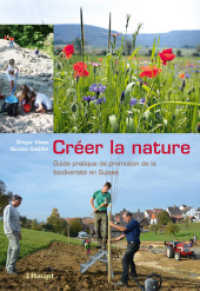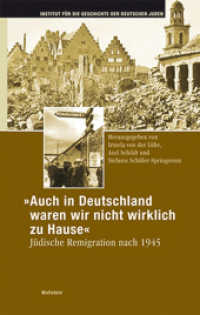Full Description
Science Homework for Key Stage 2 is a unique resource for busy teachers - a selection of 'pencil-free', hands-on activities, aligned with the National Curriculum Programmes of Study and with clear links to the topics set out in the QCA scheme of work for KS2 science, that teachers can use as extension activities or give to pupils as homework to do with members of their family or friends. Each of the activities encourages the pupils to learn through discussion and through practical activities utilising everyday resources.
Each activity is quick and easy for pupils and teachers to manage, and includes:
a learning aim, full, clear instructions and discussion points
tasks to foster collaboration and partnership between pupils, parents and teachers
photocopiable resources.
A refreshing approach for teachers and pupils, these activities will foster enthusiasm for learning and inspire pupils' interest in science.
Contents
Guidance for the teacher Introduction Pedagogy and philosophy Active Homework - the key ideas Following up on the homework Possible follow-up activities Partnership with parents Creating your own active homework Life processes and living things: Years three and four Teeth and eating: types of teeth Teeth and eating: looking after your teeth Helping plants grow well: light Helping plants grow well - growth Devising an investigation: best temperature Moving and growing: bones Moving and growing: muscles and joints Habitats: plants Habitats: food chains Debate: is it right to keep animals in zoos? Life processes and living things: Years five and six Keeping healthy: food types Keeping healthy: breakfast cereals Keeping healthy: exercise Debate: which is most important: a healthy diet or taking regular exercise Lifecycles: plants Interdependence and Adaptation Micro-organisms: types of microbes Micro-organisms: your questions Micro-organisms - composting Devising an investigation: best conditions for compost Materials and their properties: Years three and four Characteristics of materials: what would you use ...? Rocks and soils: House materials Rocks and soils: erosion Rocks and soils: volcanoes Devising an investigation: strongest rock Keeping warm (thermal insulators): comparing materials Keeping warm (thermal insulators): slowing the transfer of heat energy Keeping warm (thermal insulators): insulation in the home Solids, liquids and separating: teabags and sieving? Solids, liquids and separating: sieving Materials and their properties: Years five and six Gases around us: gases you know Gases around us: is air real stuff? Debate: driving versus using the bus Changing State: liquid and gas Changing state: solid and liquid Changing state: evaporation Dissolving: mixing solids with water Dissolving: reversing the process Devising an investigation: best conditions for dissolving Reversible and non-reversible change: mixing and heating Reversible and non-reversible change: your questions Reversible and non-reversible change: the water cycle Physical properties: Years three and four Magnets and springs: true and false Magnets and springs: paper springs Magnets and springs: searching for magnets and springs at home Light and shadows: opaque, translucent and transparent Light and shadows: changing shadows Friction: slipping and gripping Friction: reducing friction Physical properties: Years five and six Earth, Sun, Moon: day and night Earth, Sun, Moon: phases of the moon Debate: is space exploration good use of money Changing sounds: sound travels Changing sounds: sound travels more slowly than light Changing sounds: directing and collecting sounds Changing sounds: changing pitch Forces in action: building structures Forces in action: friction in sport Forces in action: a thought experiment Devising an investigation: shoe with best grip How we see things: reflected light How we see things: pupils responding to light How we see things: your questions







